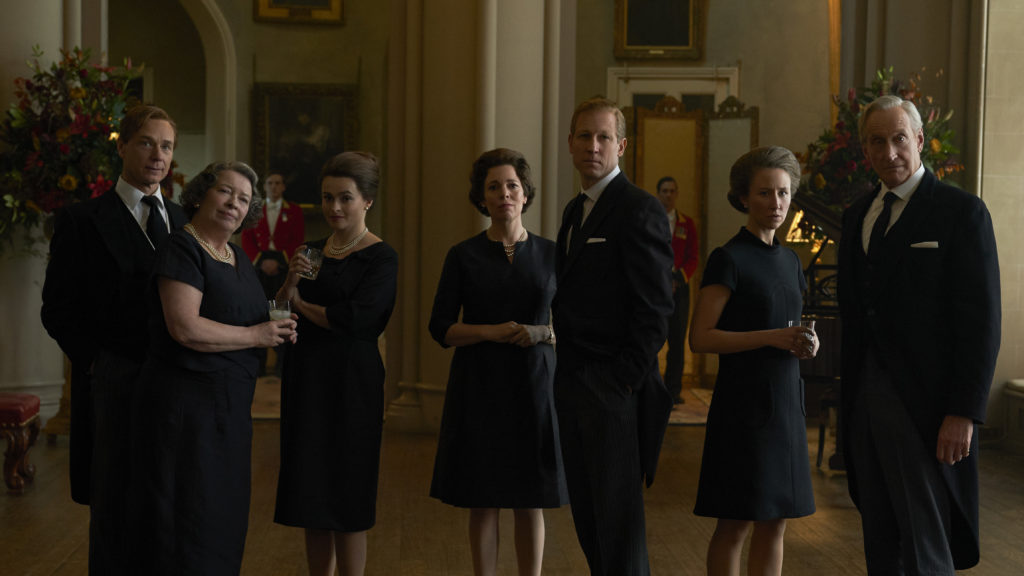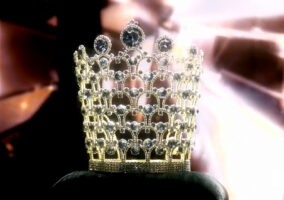
Once again, holiday responsibilities and an accompanying bout of carpal tunnel syndrome put off the completion of this review, so if you actually believed us on Friday when we said we’d get it published over the weekend, we can only offer our apology and a gentle “Bless your heart.” But in our defense, these final two episodes of season three were some of the more problematic and least cohesive of the season, making them a little more difficult to review and contextualize. It seems like all of show creator and writer Peter Morgan’s worst impulses were heightened as the season sprinted toward the finish line.
In both episodes, Morgan’s attempts to do the thing he most loves to do with this series – tie historical events to the emotional states and personal stories of the royal family – came off far too strained. We’ve spent at least part of this season commending him on his ability to connect history to emotion, so we don’t mind the conceit, even when it goes against strict historical accuracy, but “Imbroglio’s” rather puzzling insistence to contrast the miner’s strike and Edward Heath’s political ascendancy to the romantic underpinnings of the Windsor family made for a decidedly uneven and sometimes even jarring episode, careening from the Duke of Windsor’s funeral, to Charles and Camilla’s drama, to the aforementioned miner’s strike to the Queen Mother and Dickie Mountbatten scheming like soap opera villains, to the mounting political crisis of the blackouts and finally to Elizabeth making a speech in favor of marriage even as she deals with the family scheming against true love.
There was a perhaps too on-point attempt to compare Uncle David and Wallis with Charles and Camilla in a manner that tended to make everyone who made the comparison come off just a bit too self-aware and meta-textual, not to mention a bit delusional.
On the other hand, we got to enjoy Geraldine Chaplin giving this exchange the weary iciness it deserved:
“Watch out for your family.”
“They mean well.”
“No they don’t.”
Still, the show has made duty vs. love a foundational theme of the story and likes to ensure that each generation of the Windsor family has at least one whiner and problem child so as to adhere to the theme; from David to Margaret to Charles. But Charles’ expressed idea of Uncle David being so “bright, witty, independent of thought,” (a characterization that goes well against the show’s establishment of the Duke as a lazy and shallow person more often than not) as the reasons why the family “united against him,” is delusional and somewhat silly. It’s not for us to say what the correct course of action regarding Edward VII’s romantic choices should have been, but the fact of his established Nazi sympathies makes Charles’ characterization of him seem somewhat forced. Otherwise, we’d have to conclude that Morgan is deliberately writing Charles as a bit delusional or ignorant of the reality of the situation.
And all of that is kind of a shame as a creative choice because let’s face it: going forward with this series, the trainwreck of Charles’ first marriage and the melodrama of his love affair with Camilla are some of the biggest reasons for continuing the story. These opening salvos aren’t really making us all that confident in Morgan’s take on it. Charles is whiny and delusional so far, while Camilla is indecisive to the point of it being almost cruel, the Queen Mother is supposed to be taken as some sort of scheming soap opera matriarch (along with Dickie “Tywin Lannister” Mountbatten), while the Queen, ludicrously enough, is the one character arguing for openness and compassion and the right of royals to marry whomever they want; a characterization that tends to fly hard against actual history. Once again, Morgan gilds the Lilibet, making sure the central character never comes off too badly, positioning her not only as the voice of reason and love within her own family, but a person who can end the miner’s strike just by getting haughty with the prime minister.
But hey, at least we got one more killer scene with Erin Doherty as Princess Anne, swaggering into Buckingham Palace singing Bowie and rolling her eyes at her family’s tendency to be silly and dramatic about things. It remains the biggest stumble of the season that Anne’s stories weren’t given as much room to breathe as Charles’s. It’s puzzling to us that Anne and Elizabeth seemed like virtual strangers to each other (“I mean … who’d have thought it?” a flustered Elizabeth asks her mother upon the news of Anne’s “bit of fun with Andrew Parker-Bowles) when the closeness of their relationship is well-documented.
Like her other spotlight episode, “Cri de Coeur” was largely turned over to letting Helena Bonham Carter tear into playing Princess Margaret, with all the gusto she can muster. Which isn’t to say there was a lack of story here. In fact, there’s a good argument that Margaret’s whole arc from episode one has led to this moment, the biggest scandal of her life and one of the biggest scandals to hit the royal family since Uncle David.
“Contentment is dull,” says Margaret, providing an excuse for her train wreck of a marriage and something of a theme for her entire story arc; a way of dismissing the drama and dysfunction of her marriage that makes both her and her husband seem like people too interesting to be conventional or even happy. It’s a particularly self-aggrandizing way of looking at a bad relationship and we can’t tell if Morgan is implying that Margaret’s right or that Margaret’s delusional. Again, this seems to be something of a running theme with the writing this season, from Uncle David proclaiming that every crown finds its way to the right head, to Charles opining that Uncle David was just too fabulous to be king, to Margaret stating outright that she’s too singular to even consider conventional happiness. The Windsors tend to veer back and forth from being meta-textually aware of their family history to being in almost total denial about it.
The episode goes to great lengths not to take sides, which is probably fair when documenting a marriage as troubled as Margaret’s and Tony’s, but the result is that seemingly everyone is at fault for its collapse while at the same time, no one is. Margaret is bitter and difficult, Tony is manipulative, self-absorbed and shallow. The family fails to support Margaret (although this is presented as an inevitable response to the aforementioned bitterness rather than the family being unfair or cruel) and she’s all but pushed into having an affair by her friends and her husband’s lack of affection. Elizabeth even goes so far to defend her for attempting to be discreet about it by going to Mustique. Meanwhile, it’s all sweaters and mugs and cozy socks by the fire at Tony’s place. A cottage of love – with bitchy bathroom wallpaper. But when Tony is face-to-face with Elizabeth, he’s wily and manipulative, and when he’s in the same room as Margaret, it’s nothing but a raging barrage of invective in both directions. Elizabeth confronts Tony and gives a speech to him about how marriages can be about compromises and looking the other way and that two people can find happiness and contentment even if they’re apart or with other people. All of that entirely contradicts the ending – and indeed, most of the point of – season two, when she confronted Philip about his infidelities and how emotionally punishing she found them. It’s fine and probably correct to portray members of the royal family as a bit delusional and hypocritical, but as always, there never seems to be any attempt to point it out.
All of this was being contrasted with the completely unrelated return of Harold Wilson as prime minister, if only to say goodbye before retiring after an Alzheimer’s diagnosis. While it felt like a clumsy juxtaposition against Margaret’s trials and foibles, it was nonetheless wonderful to see Jason Watkins play one more final scene that transcends the script solely through his ability to use his face as an actor. His final “Your Majesty” to the queen was heavily laden with a profound sadness that this would be the last time he would ever address his sovereign – and all of that was conveyed in two seconds with exquisite facial acting.
Uneven and inconclusive as the episode was, there’s certainly no small amount of entertainment value in watching Helena Bonham Carter have as much fun as possible with the part, doing equally well portraying Margaret’s anguish as she does portraying her difficult personality. Even so, poor Helena was saddled with one of the more ludicrous “gilding the Lilibet” speeches of the seasons. After the near destruction of her life, the embarrassment of a national scandal, an overdose, not to mention a lifetime of anger and resentment over her family’s lack of regard for her because she wasn’t in line for the throne, Morgan has Margaret buck Elizabeth up about her upcoming Jubilee celebration:
“We paper over the cracks. And if what we do is loud and grand and confident enough, no one will notice that all around us, it’s fallen apart. That’s the point of us. Not us – you. You cannot flinch, because if you show a single crack, we’ll see it isn’t a crack, but a chasm and we’ll all fall in. So you must hold it all together.”
Laying the pro-Elizabeth rhetoric on with a trowel. With a shovel. As we’ve noted more than once, The Crown shouldn’t be taken as a historical document or even a form of biography. It’s a period melodrama utilizing the outlines of the royal family’s lives and selected events in 20th Century history to fuel stories that are often fanciful and often highly entertaining. But it’s entirely Peter Morgan’s view of things and it’s always best to note that when the show plays the sympathy card too hard or the soaring rhetoric starts getting a little too flowery. We thought season three showed some fairly questionable storytelling choices on his part – we will never get over skipping Anne’s kidnapping attempt – and we think we may all have to brace ourselves for a potentially problematic take on Charles’ first marriage next season. But we can’t see the recasting of all the parts as anything but a success and certain episodes – like “Aberfan,” “Bubbikins,” or “Tywysog Cymru” – represent the show at its very best.
Connie Britton in HappyxNature at the “Bombshell” Los Angeles Premiere: IN or OUT? Next Post:
“Little Women” Star Eliza Scanlen in Simone Rocha at DGA Theater’s Q&A Event
Please review our Community Guidelines before posting a comment. Thank you!



